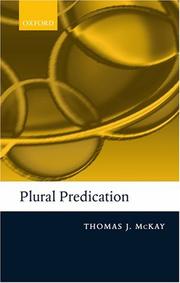| Listing 1 - 1 of 1 |
Sort by
|

ISBN: 0199278148 9780199278145 019170797X 9786610905904 0191535206 1280905905 1435623460 Year: 2006 Publisher: Oxford Clarendon
Abstract | Keywords | Export | Availability | Bookmark
 Loading...
Loading...Choose an application
- Reference Manager
- EndNote
- RefWorks (Direct export to RefWorks)
Plural predication is a pervasive part of ordinary language. We can say that some people are fifty in number, are surrounding a building, come from many countries, and are classmates. These predicates can be true of some people without being true of any one of them; they are non-distributive predications. However, the apparatus of modern logic does not allow a place for them. Thomas McKay here explores the enrichment of logic with non-distributive plural predication and quantification. His book will be of great interest to philosophers of language, linguists, metaphysicians, and logicians.
Logic --- Lexicology. Semantics --- Grammar --- Philosophy of language --- Grammar, Comparative and general --- Language and languages --- Logic. --- Predicate (Logic) --- Semantics (Philosophy) --- Number. --- Philosophy. --- Predicate (Logic). --- Semantics (Philosophy). --- Intension (Philosophy) --- Logical semantics --- Semantics (Logic) --- Semeiotics --- Significs --- Syntactics --- Unified science --- Logic, Symbolic and mathematical --- Logical positivism --- Meaning (Psychology) --- Philosophy, Modern --- Semiotics --- Signs and symbols --- Symbolism --- Analysis (Philosophy) --- Definition (Philosophy) --- Predicables (Logic) --- Predication (Logic) --- Categories (Philosophy) --- Language and logic --- Argumentation --- Deduction (Logic) --- Deductive logic --- Dialectic (Logic) --- Logic, Deductive --- Intellect --- Philosophy --- Psychology --- Science --- Reasoning --- Thought and thinking --- Dual (Grammar) --- Number (Grammar) --- Plural (Grammar) --- Number --- Methodology --- Linguistics --- Philology
| Listing 1 - 1 of 1 |
Sort by
|

 Search
Search Feedback
Feedback About UniCat
About UniCat  Help
Help News
News